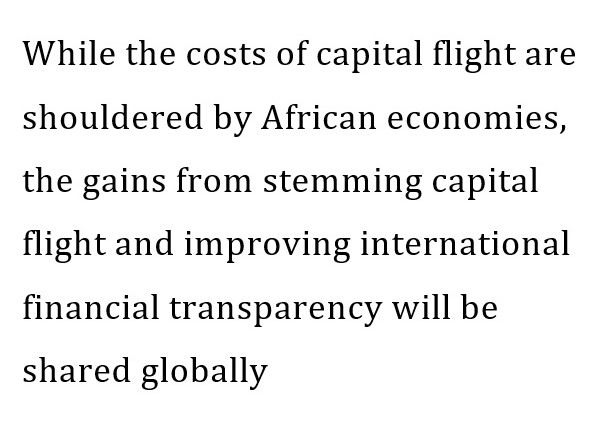
Tax Justice Network ■ Capital flight from Africa: Resource Plunder and the Poisoned Paradises in Tax Havens

In the second article of our Black Lives Shattered edition of Tax Justice Focus, renowned expert Léonce Ndikumana* explains how colonialism and the tax haven system have accelerated the rate of plunder of Africa’s vast wealth of natural resources, sustaining injustice, impunity and corruption throughout the global system.
Léonce Ndikumana
Africa’s financial haemorrhage, a paradox
While Africa has emerged as one of the fastest growing regions since the turn of the century, capital flight has, ironically, accelerated in a period marked by improvement in political and macroeconomic stability. The continent loses more than US$50 billion per year through capital flight. Why would capital flee from a ‘continent on the rise’? What do resident individuals and corporations know that foreign investors flocking into the continent do not know?

Most likely, capital flees Africa in search of protection from prosecution about the origins of the money and to evade taxation. Thus, owners of illicitly acquired wealth are happy to accept negative rates of return on their money in safe havens, in exchange for protection from legal nuisance.
The problem of capital flight is even more critical now as the continent faces protracted recession and long-lasting scarring effects from the Covid-19 pandemic. As fiscal space is threatened by declining exports and tourism receipts, African governments may be forced to cut development expenditures, which undermines provision of vital public services and derails progress in poverty reduction. The haemorrhage of wealth through capital flight means more lives lost due to lack of healthcare, more children denied education, and stunted private sector development for lack of transport, power and telecommunication infrastructure.

African resource-rich countries are particularly exposed to capital flight through embezzlement of export proceeds and export misinvoicing. Moreover, resource-rich countries lose large amounts of tax revenue through manipulation of transfer pricing by multinational corporations that take advantage of tax havens. Oil-rich African countries account for over 55 percent of total capital flight from the continent (Ndikumana and Boyce 2018). On the top of the list is Nigeria, which lost a staggering $467 billion through capital flight between 1970 and 2018.[1] The key channels of capital flight are leakages through the Balance of Payments (money that enters the country but cannot be traced in the recorded uses of funds) and trade misinvoicing (underinvoicing of exports and overinvoicing of imports). Money borrowed by governments or raised through resource exports often goes missing; public infrastructure projects are executed at inflated costs, with the difference being pocketed by politicians and channelled abroad as capital flight. As of end of 2018, Angola lost as much as $103 billion through capital flight.[2]This is a country where 76 percent of the rural population lives in extreme poverty below $1.90 per day. The national poverty rate in Angola has risen from 34 percent to 52 percent in the past decade, and the number of poor people more than doubled from 7.5 to 16 million (World Bank). For the ordinary Angolan, capital flight means more hunger and more destitution.
A key mechanism of capital flight is embezzlement of the proceeds of oil extraction and tax evasion to the benefit of multinational corporations and the Angolan elite. For example, the former President’s daughter, Isabel dos Santos has amassed massive wealth and established a global business empire by exploiting her influence in state enterprises such as Sonangol. The January 2020 ‘Luanda Leaks’ report by the International Consortium of Investigative Journalists (ICIJ) identified more than 400 companies in Isabel dos Santos’ business empire, including 94 in recognised tax havens (Shaxson 2021). Thus, Angola’s wealth has served to lubricate financial systems in the West, not only in the usual offshore financial centres, but also in the ‘supposedly onshore countries’ like Portugal (Shaxson 2021).
Angola is not alone; and wealth capture is not limited to oil. For example, Côte d’Ivoire is better known for cocoa. As of end of 2018, the country had lost $55 billion through capital flight since 1970. Côte d’Ivoire is the world’s top cocoa producer, accounting for 40 percent of global supply. Yet the country receives only 5-7 percent of the profit generated globally by cocoa (Merckaert 2020). Cocoa farmers get little reward for their hard labour. Most of the value of cocoa accrues to local intermediaries, international export and processing corporations, and powerful politicians. This system has been preserved by successive political regimes; for everyone that matters gets their cut; the Ivorian people lose, but they have no means to change the system. As the country’s wealth is expropriated through capital flight, the Ivorian people lack basic services. Less than 40 percent of the population have access to clean sanitation facilities.
South Africa, another richly endowed country, has suffered from capital flight orchestrated by an intricate network of players and enablers connected to both the domestic political system and the international financial system (Ndikumana, Naidoo and Aboobaker 2020). From 1970 to 2018, South Africa lost a staggering $329 billion through capital flight. The proceeds of massive misinvoicing of mineral exports, embezzlement of state resources in the context of ‘state capture’ by powerful and politically connected individuals and corporations, and corporate tax evasion have fuelled the accumulation of private wealth in offshore financial centres. The inability to take full advantage of its own resources is a major reason for the slow progress in poverty reduction in ‘the most unequal country in the World’.[3] The top 10 percent richest of the population own 51 percent of the country’s wealth; the bottom 10 percent hold less than 1 percent.
Capital flight, a reincarnation of colonial resource plunder
Capital flight from Africa is a modern-day reincarnation of the colonial state-led plunder of the continent’s natural resources. In this new scramble for Africa, multinational corporations replay the Berlin Conference of 1884-85 and compete for a slice of the African cake. In a world with weak corporate sector regulation, multinational corporations capture Africa’s resources for cheap and repatriating profits, leaving behind an impoverished population and a devastated environment.
Modern-day plunder of African resources operates along a sophisticated criminal enterprise value chain (Ayogu 2020), from the predicate crime (origins of the illicit funds), to the illicit cross-border transfer of funds, all the way to the concealment of the proceeds in the poisoned paradises called tax havens. The plunder of Africa’s wealth is aided by an intricate transnational takers network that takes advantage of structural flaws in the international regulatory system. The wealth of High Net Worth Individuals, corporations, and politicians is channelled through safe havens with the help of custodian banks and an industry of enablers comprising of law firms, accounting firms, audit firms, and other deal makers. Thus, the origins of the wealth are disguised, and the true beneficial owners are made ‘invisible’ with the stroke of a pen. Hence, financial crime is separated from the criminals; impunity prevails.
So, what to do about it?
From a micro perspective, evidence suggests that capital flight is not primarily the outcome of normal portfolio choice by African wealth holders (Ndikumana, Boyce and Ndiaye 2015). Therefore, while policies aimed at increasing returns to domestic investment in Africa are desirable, they are not effective in deterring capital flight. A better strategy is to strengthen the human and technical capabilities and effectiveness of specialised national institutions such as customs services, financial intelligence units, and anti-corruption agencies, to increase the capacity to detect fraud, embezzlement of public resources, illicit financial transactions, and trade misinvoicing, and to increase penalties for financial crimes. In other words, the key is to ensure that financial crime does not pay; whoever does the crime must do the time.
At the macro level, while macroeconomic stability and growth are desirable, they are not a sufficient deterrent of capital flight. Macroeconomic policies aimed at raising the returns to investment such as high interest rates are unlikely to stem capital flight, even as they suffocate domestic investment (Fofack and Ndikumana 2015). No interest rates can be high enough to persuade criminals to leave stolen money within the reach of the legal authority.

Africa needs strong rules and institutions that keep private and public sector corruption in check. At the national level, African governments must establish strong legal frameworks on transparent and accountable management of natural resources. This involves notably systematic publication of records on domestic and foreign investments in extractive industries, tax payments by corporations operating in these industries, as well as open legal proceedings of prosecutions of economic crimes. The African public has the right to know who operates in extractive industries, how much is produced, how much is exported, and how much revenue accrues to government coffers. Only then can African people hold their governments accountable, and eventually reap the gains from natural resource exploitation in the form of social development outcomes.
At the global level, the key is to increase transparency in trade and finance, especially breaking the tradition of banking secrecy, and combatting trade misinvoicing and abusive transfer pricing. The worst culprits of banking secrecy are not necessarily remote islands in the tropics, but rather major financial centres in advanced economies notably the United Kingdom and its territories, the United States, Switzerland, the Netherlands and others (Tax Justice Network, Financial Secrecy Index 2020). These are also Africa’s leading donors. They could increase the effectiveness of their aid to the continent by helping to plug the leakage of Africa’s wealth by denying a home to illicit flows from the continent. The adoption of universal automatic exchange of tax information is a major step in combatting trade misinvoicing, abusive transfer pricing and concealment of private wealth abroad. In addition, a shift to unitary taxation of multinational corporations, which would end the practice of considering subsidiaries of an MNC as separate independent entities for tax purposes, would greatly help in combatting corporate tax evasion (ICRICT).
Building national and global support for policies against capital flight requires shifting the conversation from capital flight being an African or developing countries problem to being a global problem. In this respect, it is important to emphasise that while the costs of capital flight are shouldered by African economies, the gains from stemming capital flight and improving international financial transparency will be shared globally.
* Léonce Ndikumana is a Distinguished Professor at the University of Massachusetts Amherst where he directs the African Development Policy Program at the Political Economy Research Institute. He is also a member of the Independent Commission for the Reform of International Corporate Taxation (ICRICT). He is the author and editor of books including Capital Flight from Africa: Causes, Effects and Policy Issues (with Ibi Ajayi), Africa’s Odious Debts: How Foreign Loans and Capital Flight Bled a Continent (with James Boyce), and dozens of academic publications.
[1] Ndikumana, L. and Boyce, J.K. 2021. Updated estimates of capital flight from Africa 1970-2018. PERI Report, forthcoming.
[2] Ndikumana, L. and J.K. Boyce (2021). On the Trail of Capital Flight from Africa: The Takers and the Enablers. Oxford University Press, forthcoming
[3] Pomerantz, K. 2019. The Story Behind TIME’s Cover on Inequality in South Africa. Time, 2 May,
Related articles

Malta: the EU’s secret tax sieve

The bitter taste of tax dodging: Starbucks’ ‘Swiss swindle’
Disservicing the South: ICC report on Article 12AA and its various flaws
11 February 2026

What Kwame Nkrumah knew about profit shifting

The tax justice stories that defined 2025

2025: The year tax justice became part of the world’s problem-solving infrastructure

Indicator deep dive: ‘patent box regimes’

‘Illicit financial flows as a definition is the elephant in the room’ — India at the UN tax negotiations

Tackling Profit Shifting in the Oil and Gas Sector for a Just Transition


